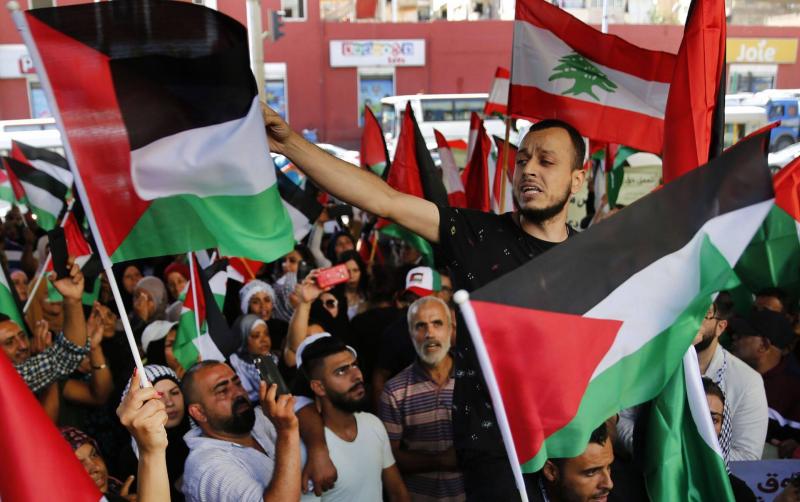Israel has 24 years left until its centenary, which it sees as a permanence, while its adversaries consider it a fragile entity on the verge of collapse before reaching eighty. It arrogantly schemes to erase Palestine, while others bet on the disintegration of the "spider's web" from the sea to the river. Both parties must eventually descend to reality at some historical moment, no matter how widespread or prolonged the conflict, and succumb to accepting a settlement crafted by international, Arab, and regional kitchens under the title "two-state solution," with ongoing ambiguity surrounding geography, demographics, sovereignty, and authority. The beginnings of this ambitious settlement have already started with the re-establishment of the Palestinian Authority and dialogue between the Fatah and Hamas movements. It is anticipated that a shift will occur in the leadership of the extremists led by Netanyahu, classified as the "king," leading to a rational Israeli authority capable of reaching a stable settlement with its Palestinian counterpart under international auspices.
What is permissible between Palestine and Israel does not seem acceptable in Lebanon, meaning a "two-state solution," because the Cedar nation has a different nature. Its division would consequently mean the division of other states in the Arab East, specifically Syria and Iraq. The rational solution that can be proposed for Lebanon's crisis could be applied to these two and other compound countries built on various components.
So what is this natural, logical, and rational solution for the Lebanese crisis that could serve as a model for others? In reality, to avoid the risks of division, which the Lebanese constitution rejects, along with the dangers of resettlement and fragmentation, and to prevent unification by force through the dominance of one group over another due to the logic of armed power or numbers, although this scenario is impractical, there are two options for a solution:
- Either a centralized state with a modern civil secular system at all levels, based on the principles of citizenship and rights, free from religious and sectarian barriers, while committing to neutrality in external conflicts. It is important to note that the claim to "cancel political sectarianism" alone conceals the risk of sectarian dominance, given its persistence in public sentiments and the texts of personal status laws and religious, spiritual, and sectarian courts. Notably, the Lebanese constitution once stated the cancellation of sectarianism without any descriptors, and twice referred to the cancellation of political sectarianism, leaving ambiguity regarding the legislator's intent—whether it meant the complete abolition of sectarianism in all areas up to secularism, or merely the cancellation of political sectarianism.
- Or a decentralized state based on mutual neutrality principles, internal neutrality of politics and authority regarding sects, and external neutrality regarding conflicts.
In both options, it becomes evident that neutrality is a necessary and crucial condition for the establishment of a stable, sovereign, and sustainable Lebanese state. Lebanon's entanglement in external conflicts has paralyzed the state since the "Cairo Agreement" in 1969 and the Syrian mandate, culminating in Hezbollah's involvement in the wars in Syria and Gaza and everything in between, which had no positive impact on these conflicts. The evidence lies in the limited contributions of the "engagement and support" war from southern Lebanon to Gaza's cause, against the backdrop of painful losses for Lebanon and the Lebanese people.
Even if there are difficulties or barriers to the first option due to the rejection of the principle of state secularism for religious or sectarian reasons or disbelief, the second option offers flexible mechanisms that allow for the flourishing of the rights, freedoms, and ways of living of the components, without inter-fighting or disputes. In reality, the sense of psychological, social, cultural, and economic safety among these components makes them more open and cooperative with each other, allowing the lines of caution, contact, and mutual suspicions to fall before the dynamics of interests and the balance of human dignity. A little courage in recognition opens eyes to the fact that the current relationship between political, popular, and communal environments is not at its best.
History teaches lessons about the collapse of forcibly imposed units, whether in the Arab world, the Soviet bloc, Eastern Europe, the Far East, or Africa. Many internal unitary states have fragmented under the pressure of the logic of force. Lebanon cannot be exempt from this rule of rejection of imposition. It previously rejected what was seen as "political Maronism," despite its achievements, then a "political Druze" experience, albeit short, with the late Kamal Jumblatt leading the "National Movement," then "political Sunni" with the martyr Rafik Hariri, and now with "political Shiism" in its militarized form under the leadership of the party. It also rejected mandates, occupations, and protections, getting rid of them in due course.
It is time for a revival of Lebanese national consciousness among those betting on making Lebanon a "weapon giant," as if it were a great power bearing the responsibility of chronic issues and attempting to overturn the unipolar world order. A little humility and cooling of heads could recalibrate the accounts to the ledger of reality, so everyone understands that finding a way out of the tunnel of crisis is not done by digging deeper into it, and that involvement in major conflicts is disastrous for its people before others.
It is true that Lebanon is too small to be divided, but it is not larger than the capacity of a country with limited resources and energies, wanting it to undertake changing the balance of regional and international powers and the strategies of nations. If these parties wish to embroil Lebanon in a "two-state solution," they should continue along this superior path by paralyzing institutions, starting from the presidency of the republic, down to rejecting international efforts and ideas to organize and control the southern, eastern, and northern borders to preserve Lebanon's sovereignty, independence, and stability.
The question remains: What kind of state do these people want with open borders for wars and all kinds of vices, while aspiring to play fantastical roles that exceed its capacity?




